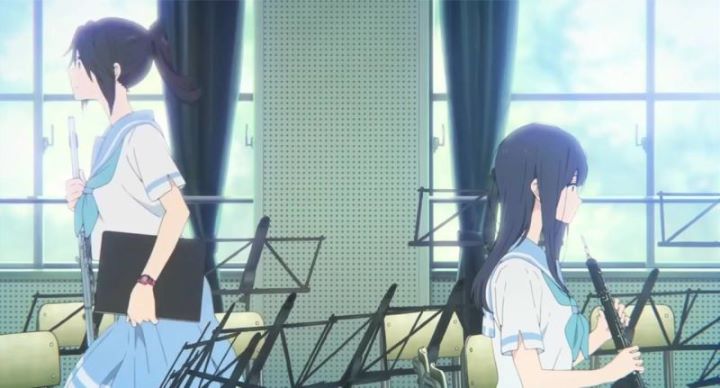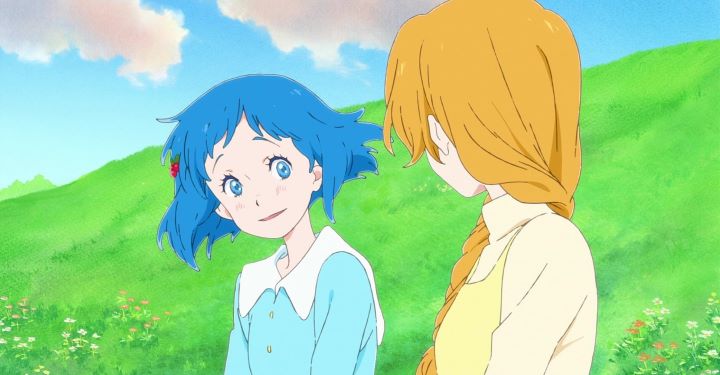








Technically, the 2018 anime film "Liz and the Blue Bird" is based on the characters of the anime series "Sound! Euphonium." You wouldn't know it from the marketing; there's no mention of the series' title, and even the character designs on the poster look different in style. And this was probably a wise move: unlike most of the movies that come from Kyoto Animation, you don't need any prior knowledge of the existing story to enjoy this standalone film, even if recognizing most of the main cast will give a little extra context to existing fans. A good thing, since the television series received a staggered and expensive release in the USA with no English dub (unlike the film), so dependency could have severely affected the success of "Liz."As to the type of movie this is, it isn't an accident that Kyoto Animation has tried to market "Liz and the Blue Bird" as being similar in tone to their successful feature film "A Silent Voice." Both films tackle the raw emotions high-school kids go through in a brutally honest and hard to watch way. Don't worry, the themes in "Liz" aren't as difficult to watch... although the movie takes its themes very seriously. Perhaps too seriously. This limits the enjoyment factor to the movie a bit more than it ought to.Despite a large cast, there are only two main characters to worry about: Mizore and Nozomi. Both are members of a music club at school (seemingly, an all-girls' school). Mizore plays the oboe, and is incredibly shy and quiet. Nozomi plays the flute, and is more active and friendly. Nozomi is understandably more popular in school, and being an old friend, Mizore looks up to her, but is inadvertently ignored by Nozomi: whenever Nozomi stops to chat or say hello, she quickly becomes distracted by another set of friends. The two are given the chance to play a duet piece for a band competition, based on a children's storybook called "Liz and the Blue Bird," about Liz (who lives alone in the woods) befriending a bird that turned into a human to spend time with her, ending with Liz letting the bird go free for its own sake. The story rings true to Mizore and Nozomi, but how? Is Mizore like Liz? Or like the Blue Bird? Or are both birds trying to find their own path without holding each other down?The storybook allegory is an inspired one, but its meaning isn't perfectly translated to the real characters, any more so than how you might relate yourself to any given story you just read. And while their struggles to play the music piece (being unable to fully understand the meaning of the story at first) give some urgency, the movie is really about the earnest feelings of friendship between Mizore and Nozomi. Mizore feels abandoned from their past history, and is scared to face inevitable graduation alone, even if it could mean a prestigous music school and a successful career. Quite literally, she needs a hug, but Nozomi too often doesn't get the hint, or tries to avoid the fact on purpose to protect Mizore or herself.  It's complicated, and credit should be given for attempting to portray these emotions. But while I might have felt these types of emotions internally at different points of my life (or can understand how others would), how the characters act on them feels unrealistic, as if only to make their emotions more obvious on screen, or to create extra drama. Surely, a simple "hug" shouldn't have so much importance? Subtlety is not "Liz and the Blue Bird"'s strong point. There is a good story in its character drama, but slow pacing and lack of subtlety robs it from hitting the bullseye.That the powerful relationship and "love" is between two girls, one could easily misread the characters for being lesbian, even though the story is purely of friendship and nothing sexual. When I saw the movie in a theater, the audience was more than 90% men between 16 and 30 years of age, even though the film seems catered strictly to teenage girls... I wonder if the production team was aware of the demographic. Production-wise, the film stands out a bit more strongly. The animation quality itself is good, although not much better than the television shows Kyoto Animation produces. The character designs are more inspired during the storybook scenes retelling "Liz and the Blue Bird," using bright watercolor landscapes and pastel fantasy-colored clothing: for this alone, the movie is a treat to see. Being a movie about a school band, the music is kind of important, and while there isn't a lot of good sountrack music in the background, the attention to detail of students tuning their instruments ans slowly improving their practice is notable. I didn't yet have a chance to hear the English dub, but the Japanese dub is strong, giving each of the characters a believability beyond what the script could do alone (not just of the two main characters, but the whole cast of students, who really sound like teenage girls, up to a point). It's bold to have "Liz and the Blue Bird" succeed as a stand-alone feature against its source material. Whether it succeeds as a feature film at all is up to the viewer. Yes, it's probably twice as long as it needs to be, and a little too on-the-nose for how its characters act and react. But there is a message here, and it can be a beautiful one of the complexity of human relationships, if you are in the mood for such a story. Having seen the movie on a quiet November night as the season's first snowfall gently filled the sky... yes, I saw this movie under the best circumstances, and can only hope the same for you.
It's complicated, and credit should be given for attempting to portray these emotions. But while I might have felt these types of emotions internally at different points of my life (or can understand how others would), how the characters act on them feels unrealistic, as if only to make their emotions more obvious on screen, or to create extra drama. Surely, a simple "hug" shouldn't have so much importance? Subtlety is not "Liz and the Blue Bird"'s strong point. There is a good story in its character drama, but slow pacing and lack of subtlety robs it from hitting the bullseye.That the powerful relationship and "love" is between two girls, one could easily misread the characters for being lesbian, even though the story is purely of friendship and nothing sexual. When I saw the movie in a theater, the audience was more than 90% men between 16 and 30 years of age, even though the film seems catered strictly to teenage girls... I wonder if the production team was aware of the demographic. Production-wise, the film stands out a bit more strongly. The animation quality itself is good, although not much better than the television shows Kyoto Animation produces. The character designs are more inspired during the storybook scenes retelling "Liz and the Blue Bird," using bright watercolor landscapes and pastel fantasy-colored clothing: for this alone, the movie is a treat to see. Being a movie about a school band, the music is kind of important, and while there isn't a lot of good sountrack music in the background, the attention to detail of students tuning their instruments ans slowly improving their practice is notable. I didn't yet have a chance to hear the English dub, but the Japanese dub is strong, giving each of the characters a believability beyond what the script could do alone (not just of the two main characters, but the whole cast of students, who really sound like teenage girls, up to a point). It's bold to have "Liz and the Blue Bird" succeed as a stand-alone feature against its source material. Whether it succeeds as a feature film at all is up to the viewer. Yes, it's probably twice as long as it needs to be, and a little too on-the-nose for how its characters act and react. But there is a message here, and it can be a beautiful one of the complexity of human relationships, if you are in the mood for such a story. Having seen the movie on a quiet November night as the season's first snowfall gently filled the sky... yes, I saw this movie under the best circumstances, and can only hope the same for you.